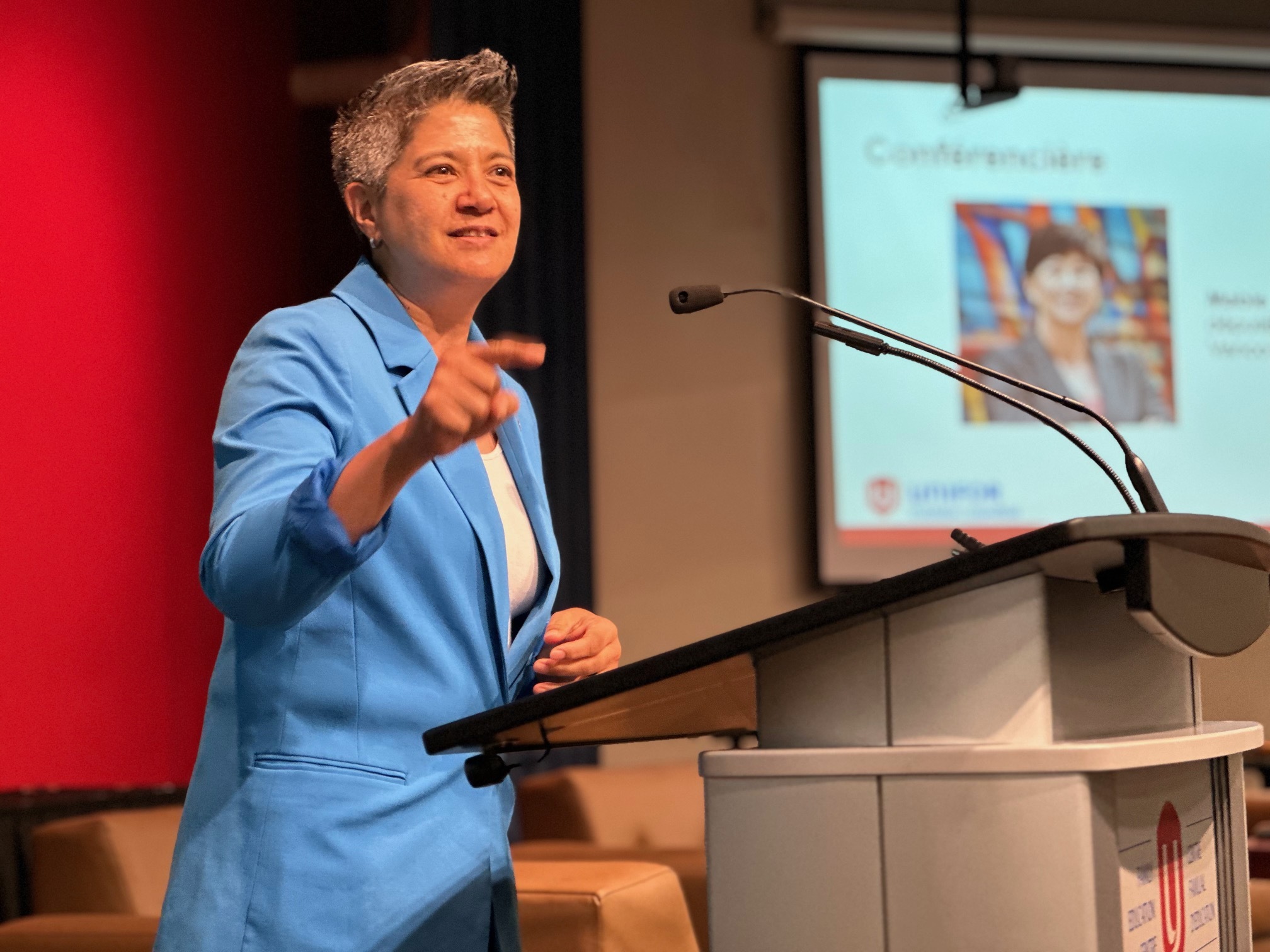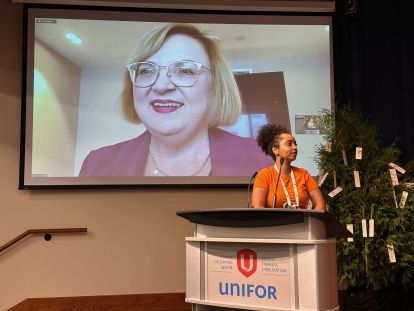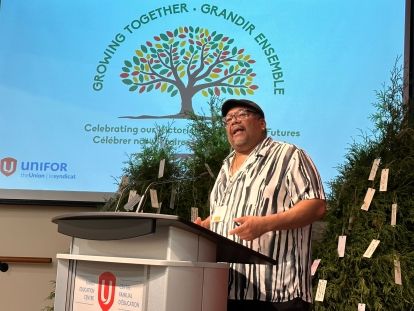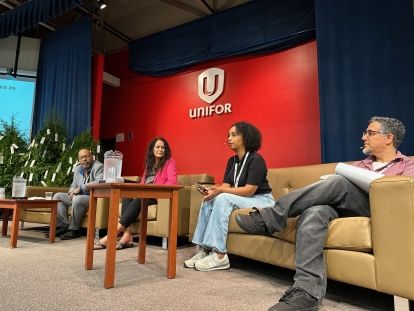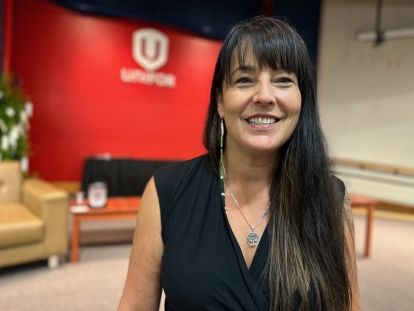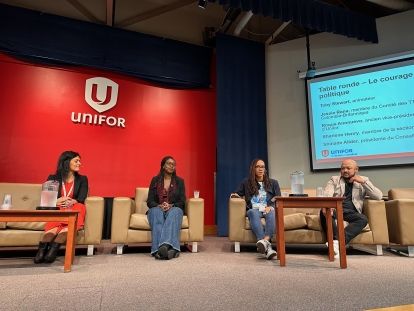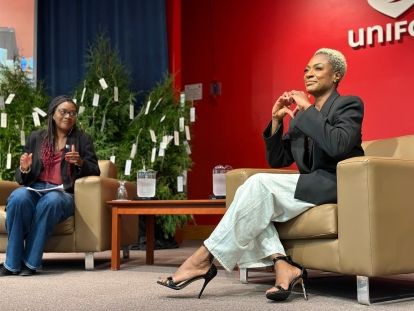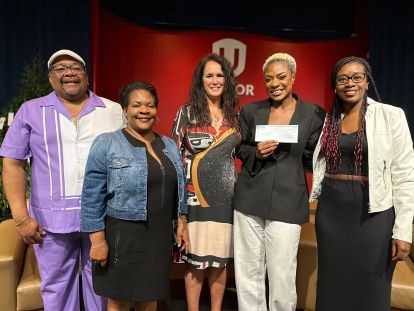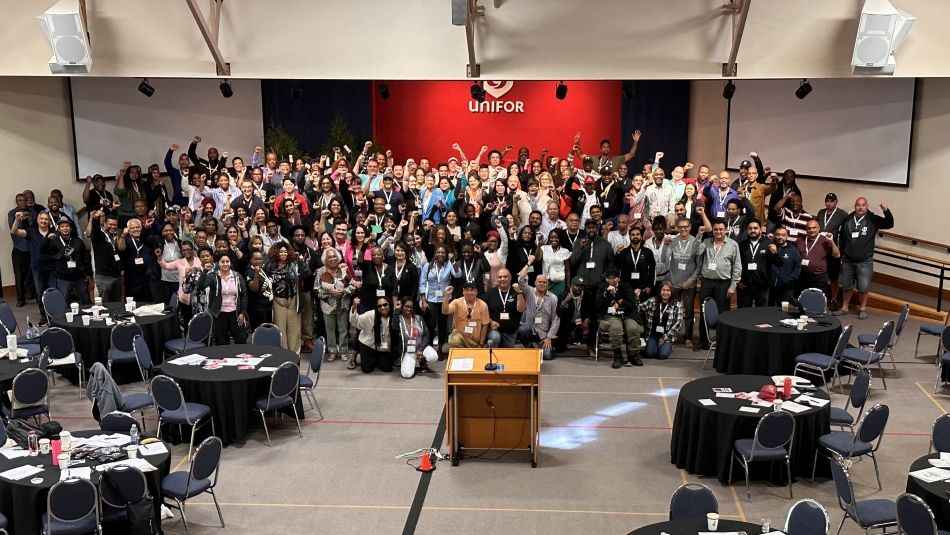
Share
Growing together.
A tree, from its solid roots to its branches and leaves, became the symbol of the Black, Indigenous and Workers of Colour (BIWOC) Conference that ran Sept. 15 to 17 in Port Elgin, Ont., symbolizing the theme “growing together,” a decade of Unifor’s victories through the lens of BIWOC communities, and continuing to build on these victories moving forward.
"I've seen how high energy and exciting this conference is and that's what we want," said Unifor National President Lana Payne, speaking to delegates via Zoom in order to attend to auto bargaining in Toronto.
"I'm so proud to see so many [of our BIWOC members] in leadership positions."
Payne shared that Unifor will support another national Tears to Hope initiative in October 2024 and will be donating $75,000 towards helping to open a healing lodge for families of Missing and murdered Indigenous women, girls and 2SLGBTQI+ people.
She also outlined how the union has expanded the number of resources dedicated to equity work, including rewriting the BIWOC course, new Racial Justice Advocate materials, and using the bargaining table as a place to advance equity.
Payne announced Unifor will be allocating $250,000 for a new Equity Fund to encourage and support local unions doing work on equity issues.
Unifor National Executive Board BIWOC Representative Dereck Berry called the conference historic.
“Not only is this 10 years of Unifor, but this is historic because we’re going to put somebody up of Indigenous ancestry on our National Executive Board,” he said to applauding delegates. “I want to acknowledge that we have in our house people in positions of leadership. That’s what this is about.”
Some 200 members from across Canada attended the conference at the Unifor Family Education Centre. Friday evening’s event began with a land acknowledgement from B.C. BIWOC Committee Local 111 member Jessie Rana, followed by an Indigenous welcome by Elder Shirley John.
Delegates heard from a slam poet, and down the hall, children and parents listened to Indigenous author Dorothy Ladd, who read from her book, Memengwaa: The Monarch Butterfly.
The second day of the conference began with a passionate panel discussion where panelists spoke about how they became active with union work, the barriers they've faced and overcome, and how Unifor can strengthen and expand its BIWOC work.
Unifor Local 222 former President Colin James, the first Black president at the local, said when the Aboriginal Workers of Colour (AWOC) committee began, they had a hard time getting 25 or 30 people, and some locals wouldn’t recognize the committee for a conference.
“We’ve come a long way,” he said. “Hopefully, this keeps growing. It’s very important that we keep this going.”
Unifor International Department and Social Justice Fund Director Navjeet Sidhu said he felt a lot of self-doubt and anxiety growing up as one of the few brown people in his town, and felt he had to work harder in order to prove himself to white people.
“It was a paradox of being a ‘visible minority,’ but feeling invisible in a workplace,” he said.
“And barriers of having a different sounding name and what are the preconceived notions of what people are thinking about you as you introduce yourself. How I’ve overcome that, and not in a healthy way, is by doing much more work, working twice as hard to get half as far.”
When asked how Unifor can support the future of BIWOC, the union’s Ontario Regional Director, Samia Hashi, said it’s about creating more spaces and opportunities for Black, Indigenous and Workers of Colour.
“It’s not going to be just getting elected to a role, it’s going to be very different ways of navigating the systems that are already there,” she said. “They are very hard to break down, but we have to be creative in how we create those opportunities for folks in our BIWOC communities.”
During the conference, Michelle Wilson was elected as the Indigenous Chair for the National Executive Board and will immediately serve a two-year term.
"I'm so honoured," she said. "I'm so excited I get to start this journey. There's so much more to do."
Also on Saturday, members brainstormed priority issues in regional breakout groups, which will be brought to Unifor leadership.
BIWOC Conference keynote speaker Mable Elmore, the first Member of Legislative Assembly of Filipino heritage elected for Vancouver-Kensington, said new B.C. legislation in spring 2024 aims to dismantle systemic racism. Unions can also propel similar change.
“This connects in the experience with your locals around the relationships between your bylaws, your constitutions, your elected leadership and our legislative framework that government passes,” she said.
“Our process around how do we decolonize is about moving together in respect with Indigenous Peoples, co-developing, and working together with racialized individuals, communities, and organizations. We have to rebuild trust.”
In another panel on Saturday, Unifor members – whose activist spirit has driven change and supported the broader movement for social justice – offered insight on how to expand personal wins to support BIWOC opportunities.
Jessie Rana was joined by former Local 3003 vice-president Roque Anonuevo, Ontario Regional Council Chair Shinade Allder and Local 1285 member, Sharlene Henry.
“What hit me that I was doing something remarkable was when I ran for ORC Chair in December and was sitting there in the room with my son, who was 19, beside me, and seeing my name on there and winning,” said Allder.
“Then, going to the front of the room and realizing, ‘Oh my goodness, I am the first Black Ontario Regional Council Chair.’ It has been previously predominantly white men. Representation matters. I am going to make a difference in this role and focus on our BIWOC community and see what I can do for them and not take this role for granted.”
The panelists described their community outreach efforts, which included everything from empowering Black youth to reach for leadership roles, toy and winter coat drives, racism awareness initiatives, and more.
Henry said after she took a number of Unifor education courses, she was inspired to join forces with a local politician, and they created a tenant union. They knew their area was half renters and half owners and gentrification is happening everywhere in Toronto.
“She brought me into this community where we can learn about these laws and fight and make your place a better place to live,” she said. “I sit here in 2023 on an official rent strike – the first one in Toronto in seven years. I have 300 people on this rent strike and we’re fighting for fair and affordable housing.”
Juno-award winning singer Jully Black lifted up delegates, sharing her wit, humour, and emotional vulnerability as she talked about her decision to change the lyrics to O Canada to “our home on native land,” including the backlash she encountered, which led to a conversation about the impact of a mob mentality on mental health.
"There's only one way to sing it. There's no going back. I actually wanted to sing, ‘Our home on Indigenous land.’ You get to the point where the whole thing needs a remix,” she said.
“What I appreciated [about the hate mail] was what it showed the world. Racism is in Canada. Let’s not deny it. It is alive. Mental health is health. It was amazing to represent the humanity of things. To represent that I hurt, too, and it hurt to hear some of the name-calling.”
Speaking lovingly about her late mother, she said she wrote the 2005 song, “I travelled” to honour her.
“I was going through a rough time. I called her and she talked about coming to Canada in 1968 and just realizing…staying authentic and staying true to who you are…There’s no shame in our stories, we need to tell our stories,” she said.
Members who were fans of Black lined up at the microphones to express how her music and mental health work has positively impacted them.
“During Covid lockdown, my daughter and I followed (Black) on Instagram for motivational health stuff and she started doing mantras,” said Sharlene Henry. “So, my daughter says, ‘I am Black, I am bold, I am beautiful.’ And that came from Jully.”
Patrick LeBlanc, Unifor Local 2002 BIWOC representative for JTS in Halifax, offered Black a handwoven medicine wheel necklace, which she graciously accepted.
Black finished her keynote address by calling on everyone in the room to use their phones as flashlights and invited them to join her in singing a heartfelt rendition of Bill Withers’ “Lean on Me.”
During a formal dinner that evening, Unifor announced it was donating a combined $15,000 on behalf of the national union, Ontario Regional Council and B.C. Regional Council to the Jully Black Family Foundation, which supports advancing education of women ages 17 to 35 in Ontario by offering bursaries and scholarships.
On the final day of the event, Unifor’s national representative for Indigenous Relations Gina Smoke encouraged delegates to support calls to action on Parliament Hill in Ottawa on Sept. 18 – the day after the conference – to search the Winnipeg landfills for missing and murdered Indigenous women, girls and 2SLGBTQI+ people.
“I don’t know anyone who would be okay with [not searching],” she said. “If this was your daughter, granddaughter, mother.”
To arrive full circle at this year’s theme, three white cedars trees were displayed on stage of the main assembly hall, each containing paper tags with messages written on them by members, including “Equity for all,” “Respect” and “Unity among us.” The arbor serves as a reminder that as they grow, so too, does the activism of Unifor members.
“It was really interesting to see some of the things that you folks have put on this tree,” said Berry.
“We’re going to pick a specific place for them, so every time you come up to Port Elgin, you’ll remember where you were on the 10th anniversary.”

